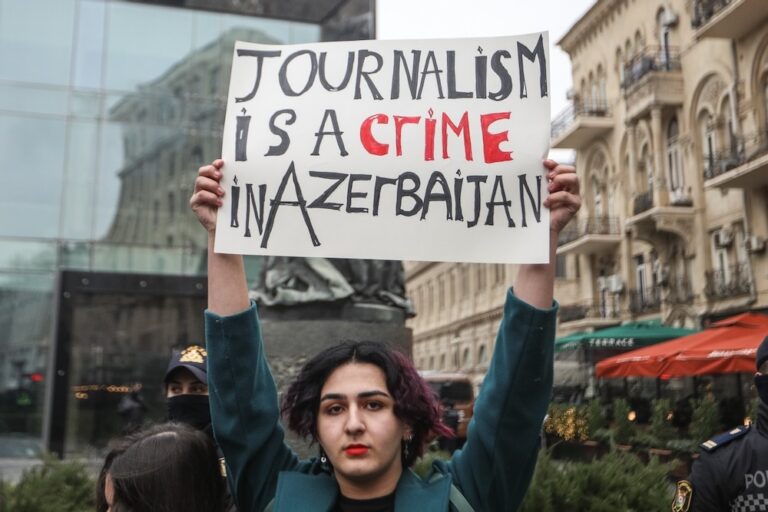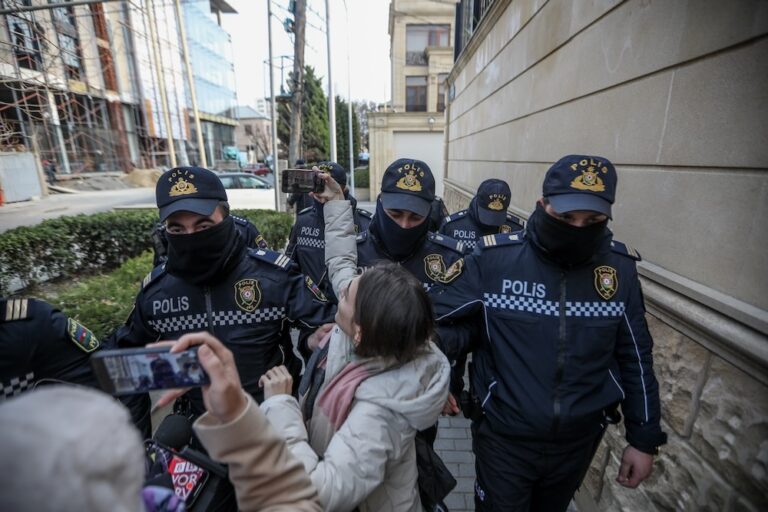(IRFS/IFEX) – IRFS condemns a 15 July 2008 decision by the Nasimi District Court, recognising Sergey Strekalin as the person who stabbed “Azadlig” newspaper correspondent Agil Khalil on 13 March. Judge Shahin Abdullayev found Strekalin guilty of both “intentional infliction of minor bodily harm” (for the 13 March stabbing) and “possession of narcotics” (for a […]
(IRFS/IFEX) – IRFS condemns a 15 July 2008 decision by the Nasimi District Court, recognising Sergey Strekalin as the person who stabbed “Azadlig” newspaper correspondent Agil Khalil on 13 March.
Judge Shahin Abdullayev found Strekalin guilty of both “intentional infliction of minor bodily harm” (for the 13 March stabbing) and “possession of narcotics” (for a separate and unrelated incident), but sentenced him to only 1 year and six months’ imprisonment. The maximum prison sentence that could have been imposed is 5 years. Khalil turned his back on the judge as a sign of protest when the sentence was announced.
IRFS believes that the adoption of the verdict is an attempt to conceal and protect the people who are really behind the stabbing, and a continuation of the long-standing government smear campaign against Khalil.
Neither the trial nor the investigation into the case was conducted in a professional or fair manner. Throughout the process, Khalil repeatedly said he did not know Strekalin and that he was not the assailant. Furthermore, a list of telephone calls and printouts of text messages, supposedly sent from Khalil’s telephone to Strekalin, forms part of the evidence presented by the National Security Ministry’s Anti-Terror Center. However, this documentation does not have a stamp from the “Azercell” company or any other authenticating markings that would prove that the information originated within the company and not the National Security Ministry itself. Khalil was interrogated for 19 hours in connection with the 13 March stabbing, during which the investigators used force against him. All of the motions put forth by Khalil’s lawyer during the trial were rejected.
Strekalin was first presented to society as Khalil’s former boyfriend on 7 April, in a widely broadcast video prepared by the Prosecutor’s Office and broadcast on local television stations. However, prior to this, on 4 April, “Azadlig” director Azer Ahmedov conducted an emergency conference and forewarned the press that this type of video footage would soon be shown. Ahmedov correctly noted that a person named Sergey was involved, and said that Khalil had been blackmailed by the investigative team. According to Ahmedov, an investigator told Khalil, “Either publicly claim that one of your colleagues from ‘Azadlig’ stabbed you, or we will broadcast video footage that will depict you as a homosexual.” [This is mostly frowned upon in Azerbaijan.]
IRFS recalls that on 9 April, during a press a conference in Azerbaijan, Organization for Security and Co-operation in Europe (OSCE) Special Representative on Media Freedom Miklos Haraszti said that he had personally met with Khalil’s mother, Khurman Khalilova. Khalilova told Haraszti that Investigation Department Chief Investigator Ali Guliyev came to their region, Kurdamir, and put certain demands on her and her family, saying that if they did not obey these demands, disgraceful video footage about her son would be broadcast on national television. Khalilova also reported that bribes were offered to the family by the investigative team.
According to IRFS, the 15 July verdict is a perfect example of yet another case in Azerbaijan in which the people truly responsible for harming a journalist have gotten off with complete impunity. To date not a single person has been held responsible for an attack on a journalist. In a related case, there is photo and video showing that National Security Ministry officers Dagbeyi Allahverdiyev and Akif Chovdarov beat Khalil on 22 February. However, these individuals are not under investigation.
IRFS believes that the verdict violates Articles 8 (violation of private and family life) and 6 (right to fair trial) of the European Convention on Human Rights. The organisation calls on the government of Azerbaijan to overturn the court decision, take disciplinary measures against Judge Abdullayev, and reinvestigate Khalil’s stabbing. In addition, IRFS calls on the international community to compel Azerbaijan to prevent instances of injustice against journalists and, if necessary, to institute sanctions against the government.
In a related development, the Chief Prosecutor’s Office’s official order banning Khalil from leaving the country will soon expire. The Chief Prosecutor’s Office had claimed it was keeping the journalist in the country because of the pending case before the Nasimi District Court. According to Azerbaijani legislation, the above-mentioned order is only applicable up to 20 days after a first instance court issues a verdict.
“Three times, for no reason, they prevented me from going abroad,” Khalil told IRFS on 15 July. “The Chief Prosecutor’s Office would not let me leave the country. It cannot be ruled out however, that in the near future I will travel abroad.”
At the same time, Khalil said he still believes that he might encounter problems when trying to leave. “In general this decision of the prosecutor was absurd,” said Khalil. “If I get an invitation abroad, I will definitely go. However, they will probably try to find another excuse to not let me leave.”
Updates the Khalil case: http://ifex.org/en/content/view/full/94729


